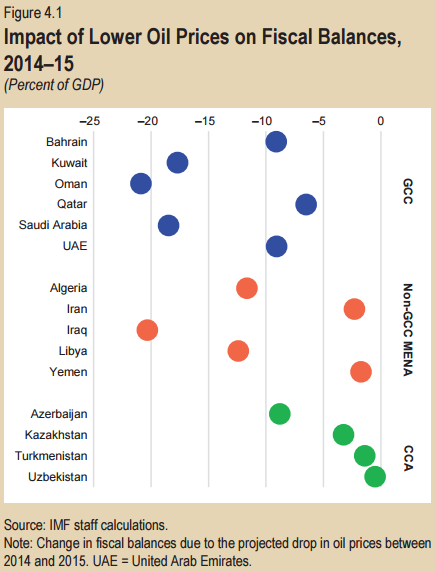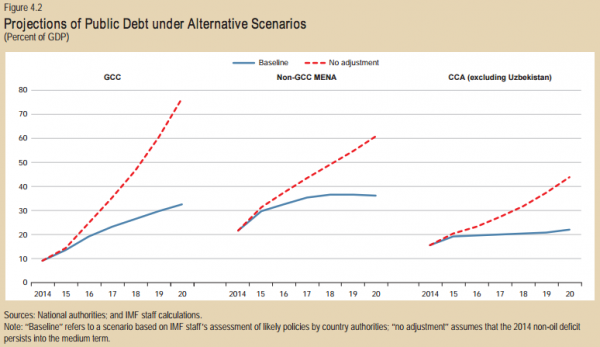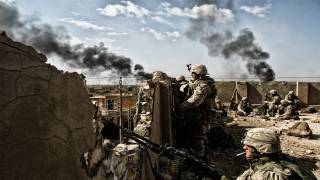Saudi Arabia Will Be Broke In 5 Years, IMF Predicts
Source: zerohedge.com
As crazy as it sounds, the Saudis are going broke.Of course you wouldn’t know it if you read the account of King Salman’s latest visit to Washington which included booking the entire DC Four Seasons and procuring a veritable fleet of Mercedes S-Class sedans.

You’d also be inclined to think that everything is fine if you simply looked at SAMA holdings (i.e. FX reserves) which still total nearly $700 billion.
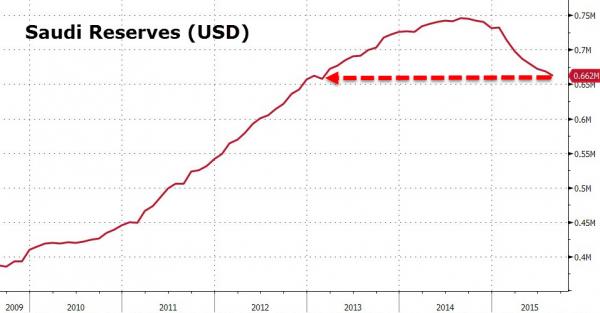
The problem however, is the outlook.
Fighting wars costs money and so does bribing the citizenry to ensure you don’t get some kind of Arab Spring-type uprising. When you endeavor to artificially suppress the price of the export that is the source for your wealth and international prestige (all in an epic attempt to bankrupt the competition and secure geopolitical “ancillary benefits”) you don’t do yourself any favors from a financial perspective and now, the Saudis are staring down a massive budget deficit and a current account that’s in the red for the first time in ages.
So while things may look on the up and up from an FX reserve perspective (even as the cushion is at its lowest level since 2013) and while the kingdom has plenty of capacity to borrow with a debt-to-GDP ratio of just a little over 2%, things are about to get ugly very quickly going forward and if Riyadh decides to plunge headlong into Syria’s civil war, it will only get worse. Note that while debt levels are likely to stay low relative to a world where countries like Japan are borrowing so much that the number of decimal places won't even fit into a title, going from basically 0% to ~16% of GDP in the space of just 24 months isn't exactly a good sign:
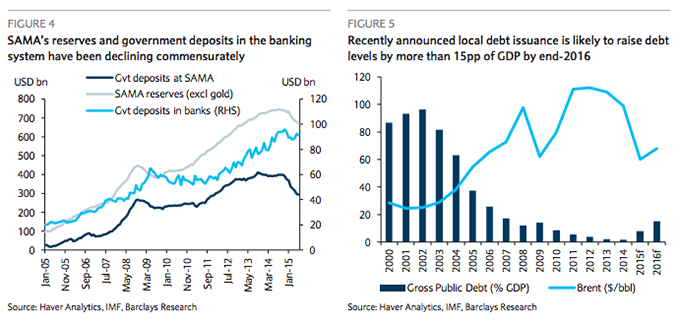
The situation is in fact so dire that the Saudis have begun delaying payments to contractors in an effort to preserve cash.
On Wednesday, the IMF is out with a new report on the economic outlook for the Mid-East and the picture for the Saudis is not pretty. In short, Riyadh will burn through its cushion in less than 5 years under current conditions. Here’s more:
Sharply lower oil prices have significantly affected the fiscal prospects of oil exporters across MENA and the CCA.1 The Brent oil price is projected to average $53 a barrel in 2015, down from almost $110 a barrel in the first half of last year. Exporters’ fiscal balances have turned from sizable surpluses to large deficits, with MENA and CCA export revenues dropping by $360 billion and $45 billion, respectively, this year alone.
For oil exporters, the main policy issue is fiscal adjustment and rebuilding buffers over the medium term. The Brent oil price is projected to recover only modestly to about $66 a barrel by the end of the decade, with MENA and CCA export receipts remaining $345 billion and $30 billion, respectively, below the 2014 level, even in 2020. In the absence of adjustment, fiscal balances will remain in deep deficit in most countries, with public debt ratios rising rapidly (red lines in Figure 4.2).
Even under the IMF baseline scenario, however, public debt ratios will continue to rise in many GCC and CCA exporters (blue lines in Figure 4.2). In a number of countries, mediumterm fiscal balances will fall well short of the levels needed to ensure that an adequate portion of the income from exhaustible oil and gas reserves is saved for future generations (Figure 4.3). Bahrain, Oman, and Saudi Arabia have medium-term fiscal gaps of some 15–25 percentage points of non-oil GDP, while conflict-torn Libya has a gap of more than 50 percent of non-oil GDP.
The large and sustained drop in oil prices has increased fiscal vulnerabilities in MENA and CCA oil-exporting countries. The issue of fiscal space has become critical as oil exporters decide how quickly to adjust their fiscal policies to the new reality of persistently lower oil prices. This box considers several alternative measures of fiscal space. A good starting point is the size of governments’ financial assets—commonly referred to as “fiscal buffers.” In general, countries with larger buffers can afford to maintain fiscal deficits further into the future, so as to reduce the impact of lower oil prices on growth. On current trends, however, all non-GCC MENA oil exporters are already projected to run out of liquid financial assets in the next three years (see Chapter 1). In, contrast, CCA oil exporters have at least 15 years’ worth of available financial savings,1 while GCC countries are split evenly between countries with relatively large buffers (Kuwait, Qatar, and the United Arab Emirates—more than 20 years remaining) and countries with relatively smaller buffers (Bahrain, Oman, and Saudi Arabia—less than five years).
As a refresher, here's BofAML's sensitivity analysis which shows how long Riyadh's SAMA reserves will last under various scenarios for crude prices and debt issuance:
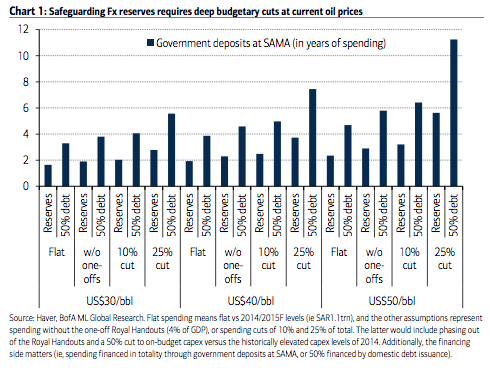
One important takeaway from the above is that if the Saudis were to burn through their reserves it would represent a nearly $700 billion global liquidity drain as Riyadh dumps its USD-denominated assets. That would amount to a complete reversal of the petrodollar virtuous circle that's underwritten decades of dollar dominance and which has served to underpin the global economic order for as far back as most market participants can remember.
And while it's by no means a foregone conclusion that oil prices will remain "lower for longer" as the Saudis are to a certain extent the masters of their own destiny in that regard, one thing worth noting is that not only is Iranian supply set to come back online, but Tehran seems determined to supplant Riyadh as regional power broker. Both of those eventualities will have very real consequences for crude prices and thus for the future of The House of Saud.
Source: zerohedge.com
Source:

